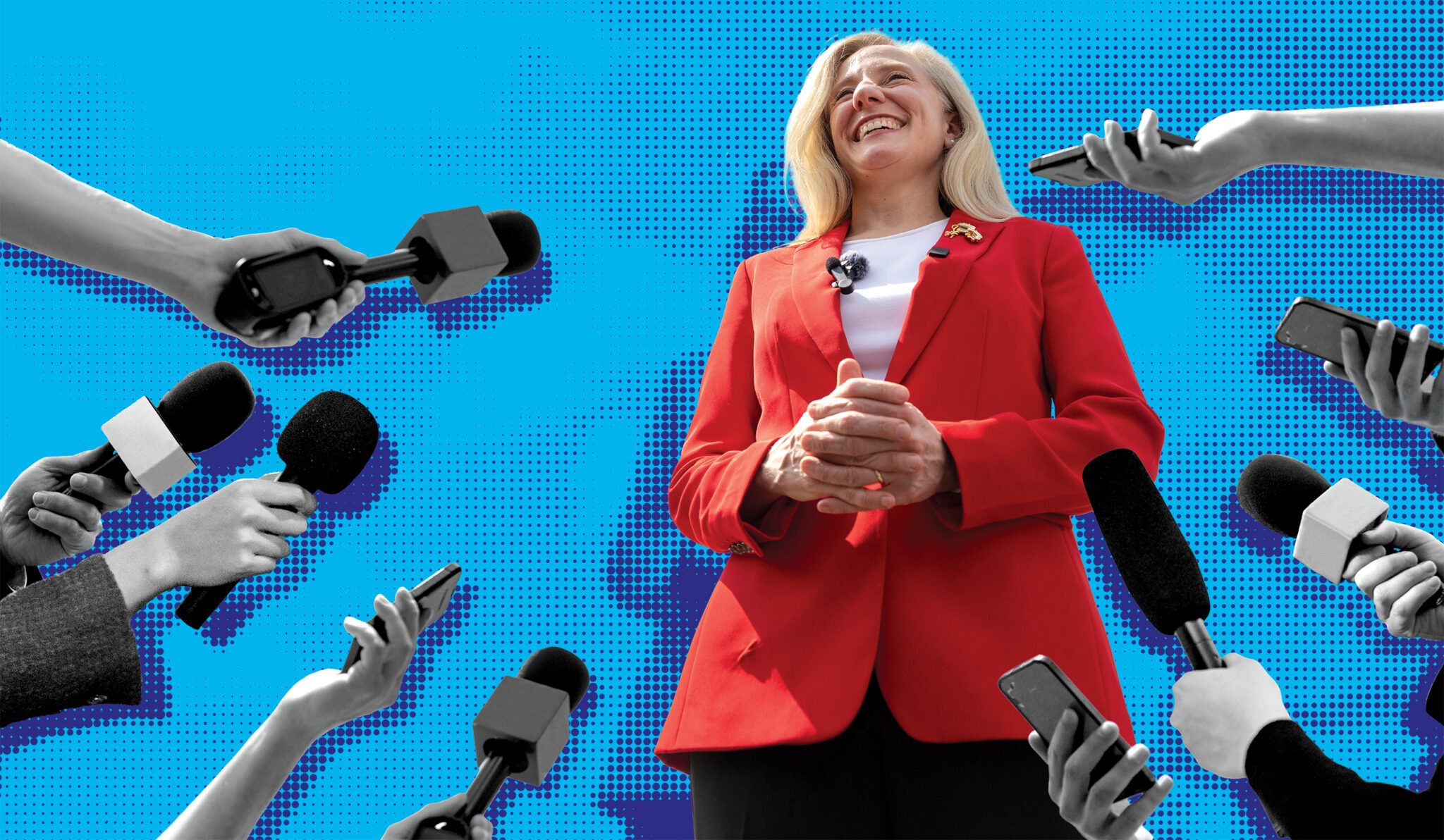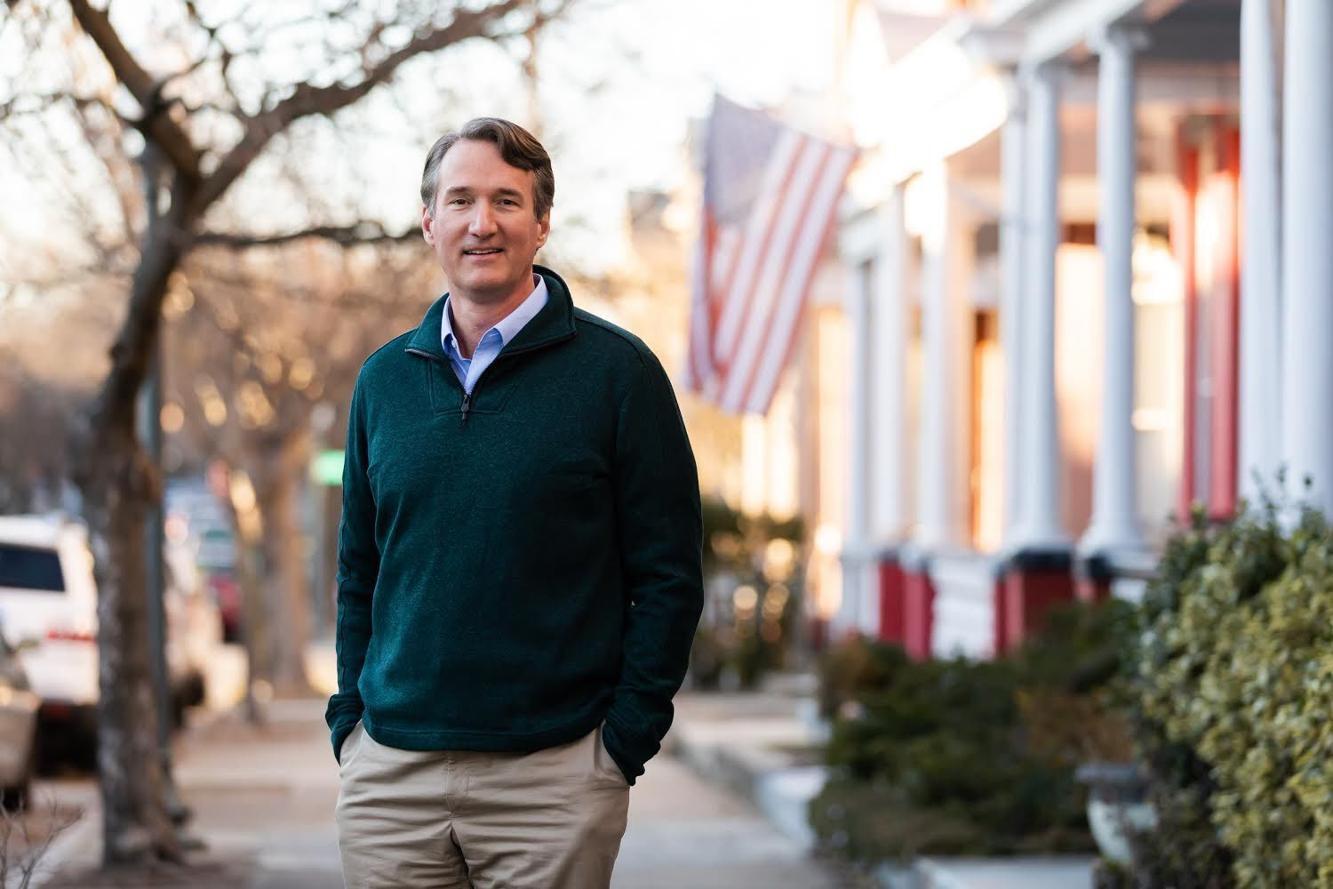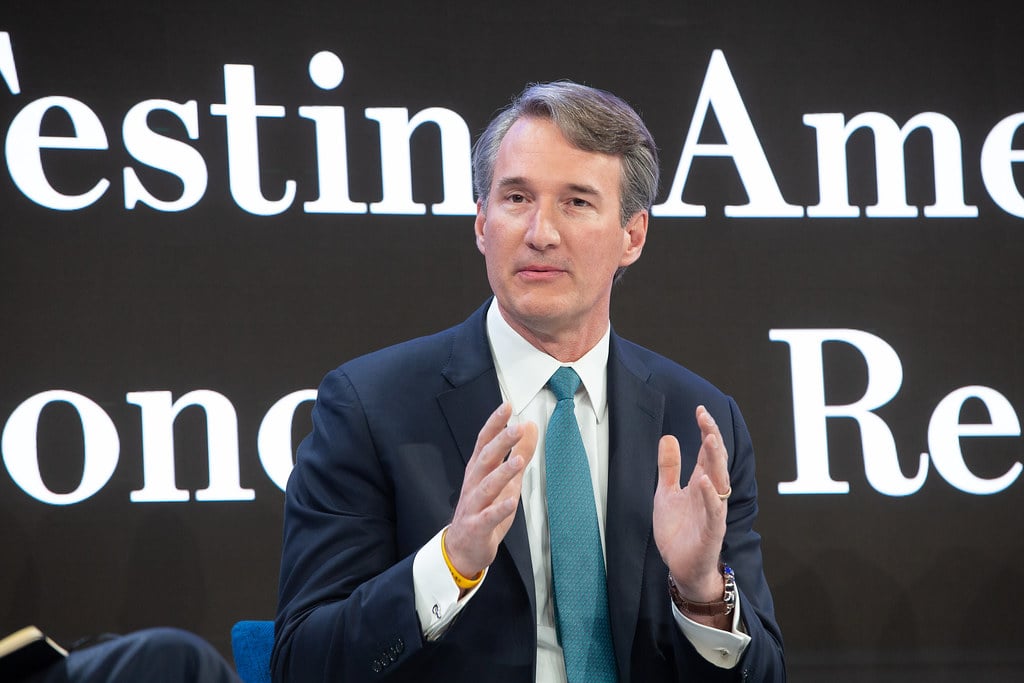On the day I met Abigail Spanberger, a particularly rough story had run in the Richmond Times-Dispatch—not about her but about her opponent, Winsome Earle-Sears. Virginia’s Republican nominee for governor, Earle-Sears had lately seemed to be floundering—poor fundraising, rarely appearing in public—and the paper quoted her own state party chair insisting that her campaign was “not a clown car.”
“I feel bad for clowns, actually,” Spanberger said when I brought it up. “They’re the ones getting insulted in all of this.” Asked if she had advice for Earle-Sears, she laughed. “I was going to say to start campaigning, but she should just keep doing what she’s doing.”
It was late July, and we were seated around a conference table at Spanberger’s campaign headquarters, in a corporate office park just west of Richmond, the kind of faceless locale that’s sandwiched between an arterial road and an artificial lake. Spanberger had entered the room tall and commanding, notably upright. She’s platinum blond and ex-CIA, businesslike but warm, makeup barely there. While we talked, she picked at a snack-size bag of Skinny Pop and sipped an afternoon Coke.
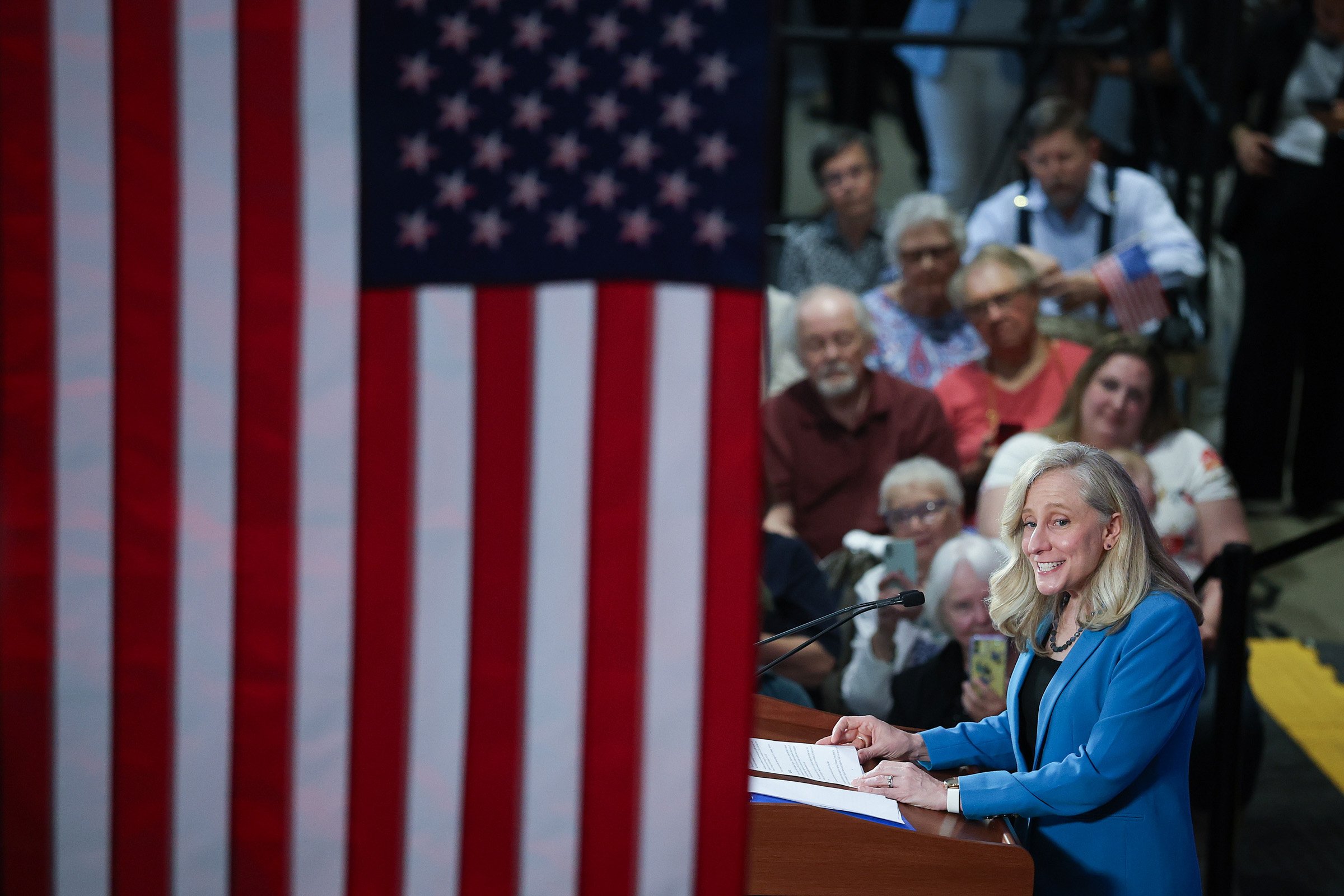
As a politician, Spanberger isn’t electrifying. She’s not an Obama or an AOC. She’s not furious like Elizabeth Warren or raw like Cory Booker. Instead, she’s calm and poised, competent and thorough. She answers questions fluidly and at length. Spanberger is running as a moderate, a professional, a no-nonsense counterweight to the chaos in Washington and the dysfunction of the Virginia GOP. On the stump, she talks policy and plans. The message is something like: As governor, I’ll keep you safe. I’ll grow your economy. I’ll make sure your kids go to decent schools.
She is seen as somebody who really cares about solutions to problems, not just gesticulating.
It’s notable, in this environment—where attention begets money begets votes—that Spanberger downplays her personality. She doesn’t go viral. She doesn’t do stunts. Political analysts I spoke with called her campaign “very disciplined” and “extremely well organized and thoughtful” and “very, very well done.” But she’s running a “cautious race, a frontrunner’s race,” said Bob Holsworth, a founding director of the Center for Public Policy at Virginia Commonwealth University. “The campaign is fairly vanilla. There’s no edge.”
In a way, Spanberger is an answer to the Trump-era cry to Make Politics Boring Again. That isn’t a knock. It works for her. In 2018, as a first-time candidate, Spanberger emerged victorious from a remarkably expensive and competitive House race. The district she won—a sprawling blend of Richmond suburbs, DC exurbs, farmland, and Piedmont—hadn’t elected a Democrat in decades. Two years prior, the Republican she beat had carried it by 15 points. Spanberger’s unlikely triumph made her a minor House celebrity, a standard-bearer for frontline Democrats, the ones from battleground districts who tend to govern as moderates and distance themselves from the troubled Democratic Party brand.
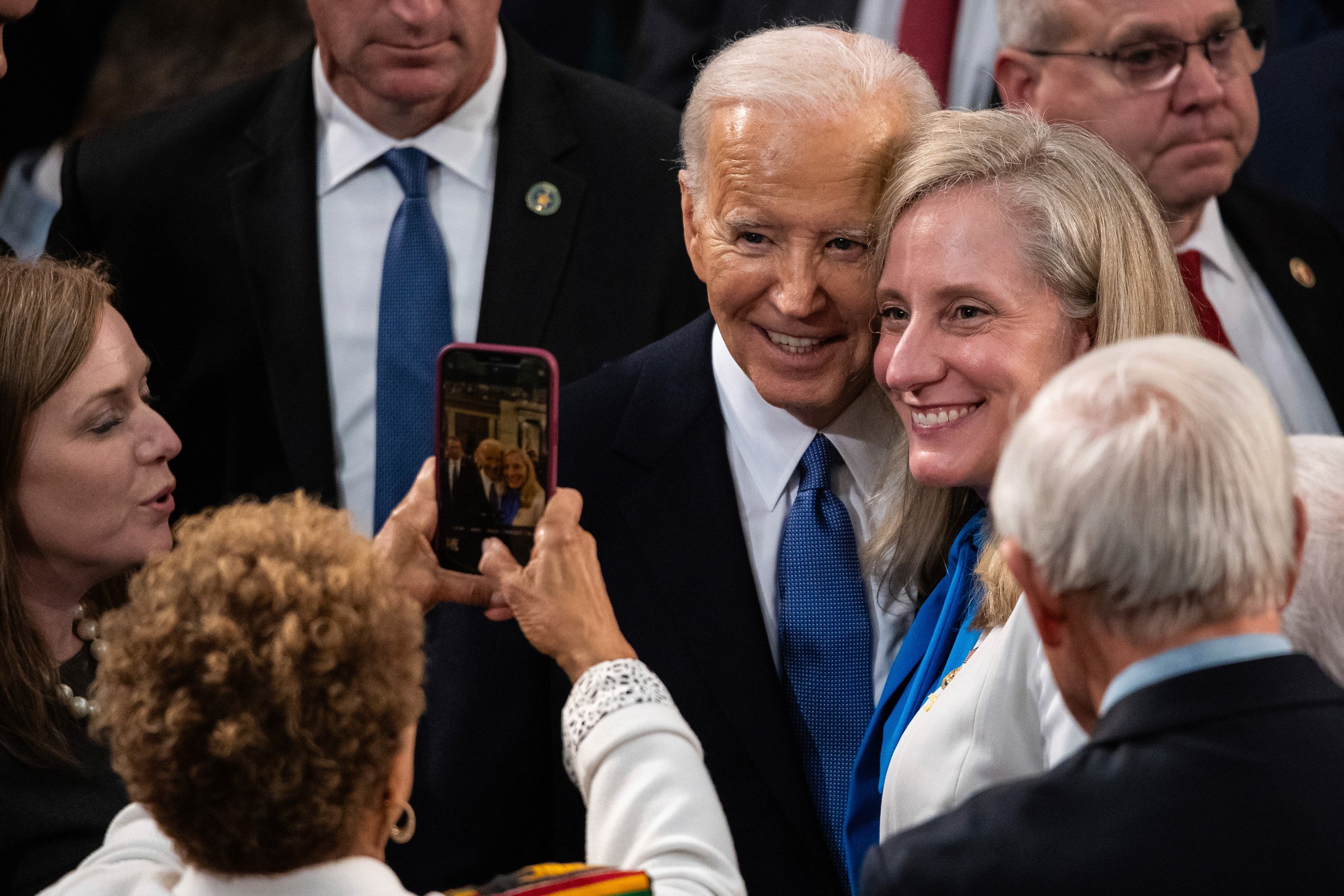
Now, after three terms in Congress, Spanberger is running for governor. The election this fall will be symbolic for Democrats, their first consequential pickup opportunity since the reelection of Donald Trump. It has the makings of a blowout. When Spanberger and I met this summer, she had amassed what the New York Times called a “fundraising advantage unseen in modern Virginia politics” and was up tenish points in the polls. Meanwhile, Earle-Sears had just fired her campaign manager, a pastor with no previous political experience, and was looking to reset from a string of damaging gaffes and a weeks-long intraparty meltdown over the candidate for lieutenant governor and an erotic Tumblr that he insisted wasn’t his.
Right now, national Democrats are desperate for a road map back to power, to cultivate leaders who can win. The ones getting attention tend to be fighting—brawling with Trump, elites, the left, or the middle. Spanberger is different. She’s a pragmatist, a wonk, credible on national security, and interested in making a deal. She succeeds not because she’s charismatic, Holsworth said, but because of “the fact that she’s serious, that she is seen as somebody who really cares about solutions to problems, not just gesticulating.”
Steve Bannon once called Spanberger’s congressional district “an absolute bellwether of the entire country,” and three times, she carried it with steadiness, moderation, and normalcy. But in this era of bombast and spectacle, could that possibly be what voters want?

There’s a particular kind of person who has a childhood dream, clutches it tight, and makes it their reality. Spanberger doesn’t remember how she first learned about the CIA—“probably from a cheesy movie, whatever version of Spy Kids existed in the ’80s”—but she knew as a young girl that she wanted to be a case officer, to speak different languages and work undercover abroad.
Part of it was about values. Her parents, a nurse and a federal law-enforcement officer, instilled in her “a lot of reverence for the notion of protecting other people and upholding the law.” The other allure was the spying. “I loved secrets,” she told me. “Not in a conniving way but in a Nancy Drew–style, figuring-things-out way.” As a kid, she thought the CIA was where you went to learn the kinds of secrets that could help people, that could keep Americans safe.
At the University of Virginia, Spanberger studied French and foreign affairs, then moved to Germany for an MBA. Back then, in 2001, the CIA needed German speakers to help untangle the wreckage of the Cold War, so she planned to burnish her language skills before returning to the States. But one day at school, she was walking through a common room and heard the loud and urgent voice of an American. It was a news reporter on TV. Slowly, Spanberger registered what had happened: The first of the Twin Towers had fallen.

“My American identity has always been particularly strong,” Spanberger told me, “but I certainly doubled down at that time.” She joked that this involved wearing flip-flops to class (“Abigail, why are you wearing shower shoes to school?” she said in a convincing German accent), but actually it meant she wanted to go home. In 2002, Spanberger returned to the US, finished her MBA, and applied to the CIA. The Agency took her—but the post-9/11 hiring boom increased processing times, so she wasn’t set to start training for several years.
While she waited, Spanberger joined the US Postal Inspection Service, a federal law-enforcement agency that handles crimes related to the mail. There, she worked cases that involved narcotics, money laundering, child predation, and suspicious powders. Her office was in the Brentwood building in Northeast DC, which had only recently reopened after the 2001 deaths of two postal employees who had been exposed to anthrax-laced letters bound for the Hill. When she worked there, the anthrax perpetrator was still at large and panic was high. “We used to get white-powder calls all the time,” she said, though none of them turned out to be real.
In 2006, Spanberger was finally called up to the CIA, and she operated stateside for a time before being sent overseas. “I was what was called ‘officially covered,’ ” she explained, “which means that, on paper, I worked for a different government agency. I just had a government job, and a relatively boring one, because when you’re lying about your job, you don’t want to talk about it that much.” During the day, she was “off meeting people for the purposes of collecting intelligence,” but then at night she’d be at home, in her neighborhood with her husband, pretending to be normal.
After that, she’s tight-lipped about the work. Where did she go? Abroad. What did she do? Mostly counterterrorism. “It was very exciting but a lot of paperwork,” is how Spanberger described that life. “And that is what I’m legally allowed to say.”

The conventional wisdom is that candidates should tell voters who they are. “We get all these political consultants saying that you have to constantly be talking about yourself,” said Spanberger’s friend Michigan senator Elissa Slotkin—another former CIA officer who flipped a House district blue in 2018. “But when you’re at the CIA or the Pentagon, you never bring up your own life, your own story. You don’t make it about you, because it’s not about you.”
In late July, Spanberger was making a run-of-the-mill campaign stop inside a low-slung brick building belonging to the International Brotherhood of Electrical Workers, in a suburban tangle of parking lots and strip malls by Manassas Battlefield Park. “I’m here today laying out our ‘Growing Virginia’ plan,” she said, standing behind a lectern in a staid black skirt-suit and bright-green top. “My plan is built on three central pillars”—but somewhere between “growing Virginia’s exceptional workforce” and “growing business and economic investments in Virginia,” my eyes glazed. The speech gave the distinct impression that Spanberger was prepared to be the governor, but she dangled no red meat for the base, told no dramatic tales of overcoming struggle. The single most personal thing she revealed is that she has an MBA.
Slotkin chalks it up to Spanberger’s character: that she’s “not using this race to raise her profile” and “not here to make her brand go viral.” But another possible reason to run on policy, not antics or charisma, is to draw a contrast to the personality-driven politics of Trump. As Stephen Farnsworth, a political scientist at the University of Mary Washington, puts it: “If there are problems with performance on the other side, then competence can be your brand.”
“Virginia is facing unprecedented attacks on our communities, on our economy, on our jobs right now,” Spanberger told the crowd at the union hall. She brought up the Department of Government Efficiency’s slash-and-burn rampage through the federal bureaucracy, which has affected the state’s more than 320,000 federal workers and their families, plus the contractors and small-business owners whose livelihoods depend on them. She called the Trump administration’s tariffs “a massive tax hike on Virginians” and, in a media gaggle, mentioned June data from the Bureau of Labor Statistics, which showed that Virginia was “the only state in the country that saw statistically significant job loss.” On the trail, Spanberger frequently describes a state beset by the chaos of a Republican White House while its Republican governor is asleep at the wheel. It’s proved a tough attack for her opponent to parry.
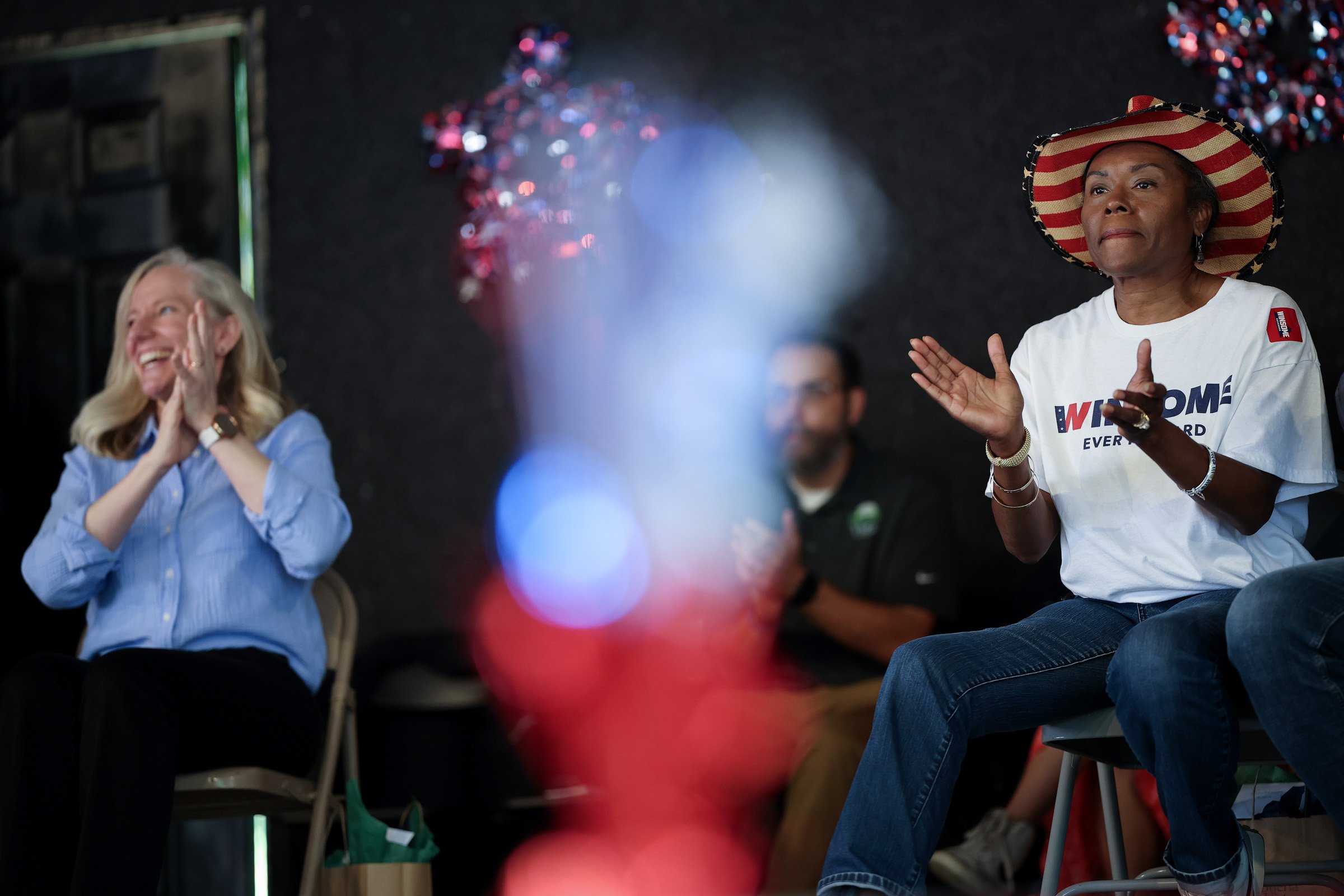
Spanberger is running against Virginia’s current lieutenant governor, Winsome Earle-Sears, an evangelical ex-Marine who immigrated to the US from Jamaica. Earle-Sears is in a tricky electoral position: defending the President in a state where about 55 percent of residents disapprove of him. It’s led to some gaffes. In March, for instance, audio leaked of her saying it’s “not unusual” to lose a job—that it “happens to everybody all the time”—so she’s not sure why the media is treating DOGE as “this huge, huge thing.” In August, she was asked on CNN if she supports federal-workforce cuts, and she wouldn’t answer. Earle-Sears can’t disavow Trump and risk alienating his base or provoking his wrath, but she’s struggling to embrace a domestic-policy agenda that UVA researchers have suggested could cost Virginia billions in GDP.
The morning Spanberger spoke at the IBEW hall, Politico had reported that top Republican donors were souring on Earle-Sears, “not looking to throw more money at what they increasingly see as a losing campaign.” This state of affairs meant, essentially, that Spanberger could run out the clock—and she seemed to be doing just that: no major missteps, few bad news stories, staying on message, not making waves. Farnsworth described her strategy in football terms: a series of three-yard plays, right to the end zone. “There are no 40-yard passes in a Spanberger campaign,” he said. “There’s no high-flying spectacles.” Steady, not dazzling, is her style.

By 2016, Spanberger had left the CIA for a quieter life in the Richmond suburbs, raising three young daughters and working for a company that provides services to schools. For most of her career, the idea of running for office had seemed “laughable.” But then Trump became President. After the election, she joined a group of Democrats—mostly women—who’d carpool around their district attending the town halls of their Republican congressman, Dave Brat. It got under his skin. Infamously, Brat lamented that “the women are in my grill no matter where I go.”
At the time, a mounting refrain in Spanberger’s orbit was Somebody has to run against Dave Brat—and she toyed with the idea that she might do so herself. “Then I started really thinking about it,” she said, “and it seemed insane.” Her kids were little, she had no experience as a candidate, and she’d have to publicly talk about her career. “My employment had only just gotten declassified, so I could barely say the word ‘CIA’ out loud without, like, making a weird grimace face.”
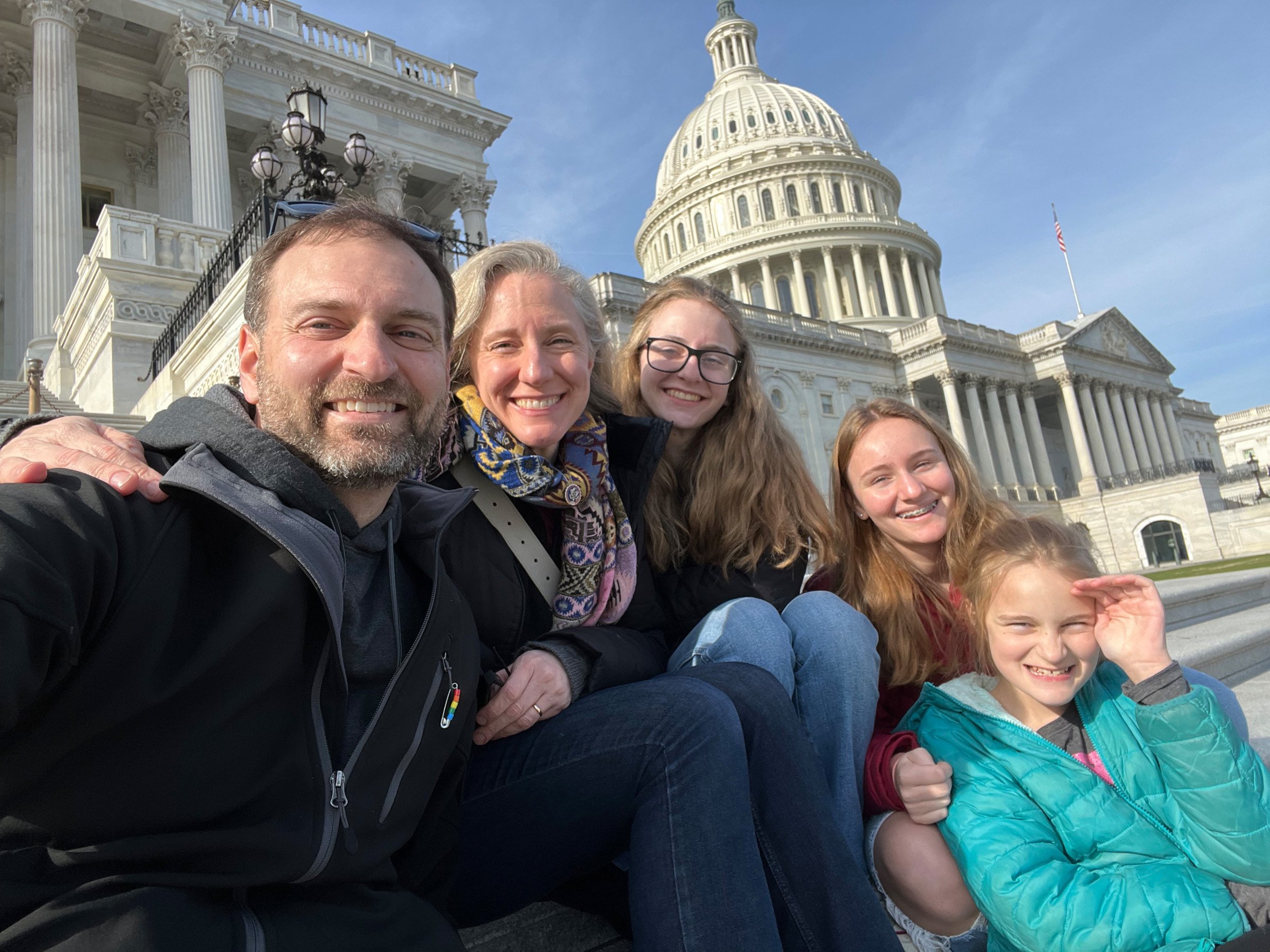
In 2017, on the day that the House of Representatives voted to kill the Affordable Care Act, Spanberger watched the Rose Garden ceremony from work. Her close friends’ daughter had recently been diagnosed with a degenerative neurological disease and the family was staring down years of intensive medical care, knowing that in the end they’d lose their child. Now their healthcare was under attack. “I just got so mad,” Spanberger said. “I called my husband, like, ‘I’m gonna run and I’m gonna fucking win.’ ”
Spanberger did win, of course—and in 2019 she was sworn in to represent a district Trump had carried by seven, where resistance liberalism had little purchase and the Democratic brand was bad. Immediately, she distanced herself from her party; her very first vote in Congress was against Nancy Pelosi for speaker. In the years that followed, she criticized Biden on spending, tried to ban members of Congress from trading stocks, collaborated with Republicans on bills like the Social Security Fairness Act, and, in 2020—after Democrats lost seats in the House—begged her colleagues to please, please stop talking about socialism and defunding the police. In the meantime, she kept her head down and worked on non-flashy issues that mattered to her district, such as rural broadband, highway repair, and reducing overdose deaths.
Her opponents aren’t really able to dent her momentum, in part because the traditional Republican attacks don’t really stick.
That first term was during the era of #MeToo, of George Floyd. Democrats were seen as ideologues and firebrands. Compromise was morally wrong. In trying to keep her party from tacking too far left, Spanberger was fighting against the winds. But now she looks canny. In tough elections, Farnsworth explained, “her opponents aren’t really able to dent her momentum, in part because the traditional Republican attacks don’t really stick.” Spanberger is a former law-enforcement officer who’s consistently ranked among the most bipartisan members of the House. Sure, Republicans can hit her on trans rights, but she doesn’t have the political liabilities of colleagues who drifted leftward on issues like immigration or crime.
In running for governor, Spanberger probably has room to move left—the state is more liberal than her district, and the overall environment for Democrats is good. When I asked why she hasn’t, she spoke for almost six minutes straight. It’s partly a personality thing, she said, that she wants to be friends with everyone. (“My husband will say, ‘Not everyone is going to agree with you or like you,’ and my retort is ‘Yeah, but I can still try.’ ”) But mostly, she talked about listening. As a lawmaker, she believes that if she’s going to support a policy, she has a responsibility to know what its trade-offs are. That’s required her to form real relationships with Republican colleagues and constituents and listen carefully to what they have to say.
Understanding conservatives has helped Spanberger learn to speak to them, which is among her political strengths—useful for talking to swing voters, and also for building coalitions. She believes that climate change is an “existential threat,” for example, but she said that in Virginia, it’s not always productive to frame it that way. If she talks instead about, say, the national-security risks related to sea-level rise, she can sometimes get skeptics to the table. To Spanberger, that pragmatism is crucial to “actually making progress on things,” but it rankles some factions of her party. “Particularly among the quote-unquote super-progressives, I would have to say, ‘Actually, we’re on the same page on these issues—I just talk about them differently,’ ” she said.
In our interview, I asked Spanberger what she’d learned from progressives. It was the only question that seemed to stump her. “I think I learned a lot,” she said, pausing. After some throat-clearing (“and this is not an indictment of anyone, and this exists across the political spectrum”), she spoke about how some members of Congress measure success as getting media attention, while others view it as passing legislation, as concretely affecting constituents’ lives.

In Virginia’s off-cycle gubernatorial elections, the media glare is bright. Analysts dissect the candidates, polling, fundraising, and messaging, treating the state as a bellwether for the midterms, a test of the electorate’s mood. The new governor immediately gains prominence; purplish Virginia is seen as a breeding ground for national figures. If Spanberger wins, there will be speculation about her future (a Senate seat, a vice-presidential nomination?), about what she means for her party and for the country, and what her victory says about who we are.
Already, there’s rumbling. In August, the New York Times ran an opinion piece arguing that “national security moms” like Spanberger and Slotkin might be an “emerging model of leader” for Democrats, one that could help the party seem tougher and less left-wing. And Farnsworth told me that Spanberger’s no-drama, policy-heavy style could be good for her colleagues to emulate: “I think that maybe America’s had enough show horses and is ready for more workhorses in public life.”
Right now, she’s like, ‘Well, I’ll find a compromise,’ But at the national level, you have to have a clearer sense of where you stand on big issues.
Still, there are reasons for caution. Democrats are hungry for fighters right now, which Holsworth sees as Spanberger’s biggest electoral challenge: to “convince people you’re fighting for them every day.” He brought up Gavin Newsom, the governor of California, who’s been sparring with Trump in the courts, hectoring and needling him online, painting him as ridiculous and small. “People think sometimes that Newsom is a little kooky, a little strange, but they have no doubt that he’s fighting,” Holsworth said. “Spanberger doesn’t have that kind of political orientation.”
For Slotkin, though, Spanberger embodies the “alpha energy” that the Democratic party lacks. Yes, she’s good at compromising, but on fundamental issues—like “free and fair elections” or “how we treat people”—Slotkin said she never backs down. (Spanberger has certainly taken some tough votes, like supporting Trump’s impeachment despite worrying it would cost her seat.) As her political stature grows, though, Spanberger probably can’t have it both ways. “Right now, she’s like, ‘Well, I’ll find a compromise,’ ” Holsworth said. “But when you start talking at the national level, you have to have a clearer sense of where you’re going to stand on big issues.”
During the media gaggle at the union hall, one such big issue arose: the war over partisan gerrymandering. This summer, Texas Republicans redrew their state’s electoral maps, trying to nab five additional seats in the House—and a reporter wanted to know if Spanberger would fight back by redistricting Virginia, as Newsom is attempting to do in California. For some Democrats, the stakes are the preservation of democracy itself. Newsom has accused Republicans of “trying to rig” the midterms, and Obama has said that California’s pushback is a “responsible approach.”
But Spanberger said she had no plans to redraw any maps, mentioning Virginia’s bipartisan redistricting commission, which implied that her hands would be tied. Listening to her, I thought of Farnsworth. This was exactly the kind of three-yard play he described: an answer both politically anodyne and factually correct, saying nothing to overshadow the economic message of the day.
A politician like Newsom throws for 40, holding forth about democracy and making some national news. But why risk an interception when you have a commanding lead? Instead, Spanberger moved on to the next reporter, who had a technical question about energy rates for data centers, the kind of issue she loves: fixable, unsexy, could meaningfully help her constituents by lowering their energy costs. “So there is an SEC case right now reviewing that exact question,” she began, three yards closer to the governor’s mansion without any defense in sight.
On the day I met Abigail Spanberger, a particularly rough story had run in the Richmond Times-Dispatch—not about her but about her opponent, Winsome Earle-Sears. Virginia’s Republican nominee for governor, Earle-Sears had lately seemed to be floundering—poor fundraising, rarely appearing in public—and the paper quoted her own state party chair insisting that her campaign was “not a clown car.”
“I feel bad for clowns, actually,” Spanberger said when I brought it up. “They’re the ones getting insulted in all of this.” Asked if she had advice for Earle-Sears, she laughed. “I was going to say to start campaigning, but she should just keep doing what she’s doing.”
It was late July, and we were seated around a conference table at Spanberger’s campaign headquarters, in a corporate office park just west of Richmond, the kind of faceless locale that’s sandwiched between an arterial road and an artificial lake. Spanberger had entered the room tall and commanding, notably upright. She’s platinum blond and ex-CIA, businesslike but warm, makeup barely there. While we talked, she picked at a snack-size bag of Skinny Pop and sipped an afternoon Coke.

As a politician, Spanberger isn’t electrifying. She’s not an Obama or an AOC. She’s not furious like Elizabeth Warren or raw like Cory Booker. Instead, she’s calm and poised, competent and thorough. She answers questions fluidly and at length. Spanberger is running as a moderate, a professional, a no-nonsense counterweight to the chaos in Washington and the dysfunction of the Virginia GOP. On the stump, she talks policy and plans. The message is something like: As governor, I’ll keep you safe. I’ll grow your economy. I’ll make sure your kids go to decent schools.
She is seen as somebody who really cares about solutions to problems, not just gesticulating.
It’s notable, in this environment—where attention begets money begets votes—that Spanberger downplays her personality. She doesn’t go viral. She doesn’t do stunts. Political analysts I spoke with called her campaign “very disciplined” and “extremely well organized and thoughtful” and “very, very well done.” But she’s running a “cautious race, a frontrunner’s race,” said Bob Holsworth, a founding director of the Center for Public Policy at Virginia Commonwealth University. “The campaign is fairly vanilla. There’s no edge.”
In a way, Spanberger is an answer to the Trump-era cry to Make Politics Boring Again. That isn’t a knock. It works for her. In 2018, as a first-time candidate, Spanberger emerged victorious from a remarkably expensive and competitive House race. The district she won—a sprawling blend of Richmond suburbs, DC exurbs, farmland, and Piedmont—hadn’t elected a Democrat in decades. Two years prior, the Republican she beat had carried it by 15 points. Spanberger’s unlikely triumph made her a minor House celebrity, a standard-bearer for frontline Democrats, the ones from battleground districts who tend to govern as moderates and distance themselves from the troubled Democratic Party brand.
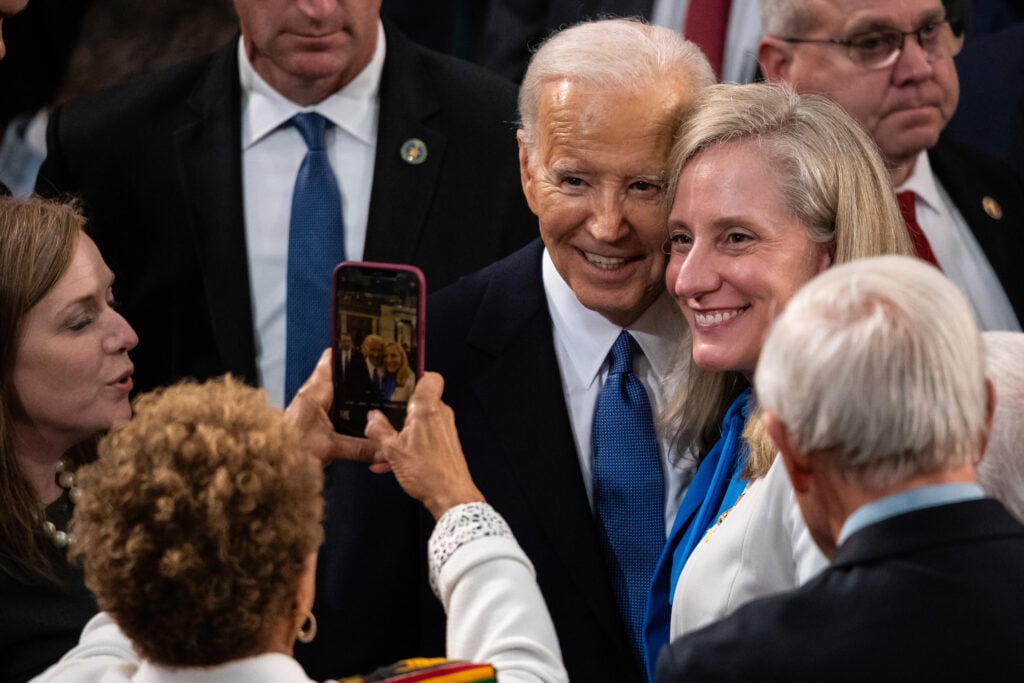
Now, after three terms in Congress, Spanberger is running for governor. The election this fall will be symbolic for Democrats, their first consequential pickup opportunity since the reelection of Donald Trump. It has the makings of a blowout. When Spanberger and I met this summer, she had amassed what the New York Times called a “fundraising advantage unseen in modern Virginia politics” and was up tenish points in the polls. Meanwhile, Earle-Sears had just fired her campaign manager, a pastor with no previous political experience, and was looking to reset from a string of damaging gaffes and a weeks-long intraparty meltdown over the candidate for lieutenant governor and an erotic Tumblr that he insisted wasn’t his.
Right now, national Democrats are desperate for a road map back to power, to cultivate leaders who can win. The ones getting attention tend to be fighting—brawling with Trump, elites, the left, or the middle. Spanberger is different. She’s a pragmatist, a wonk, credible on national security, and interested in making a deal. She succeeds not because she’s charismatic, Holsworth said, but because of “the fact that she’s serious, that she is seen as somebody who really cares about solutions to problems, not just gesticulating.”
Steve Bannon once called Spanberger’s congressional district “an absolute bellwether of the entire country,” and three times, she carried it with steadiness, moderation, and normalcy. But in this era of bombast and spectacle, could that possibly be what voters want?

There’s a particular kind of person who has a childhood dream, clutches it tight, and makes it their reality. Spanberger doesn’t remember how she first learned about the CIA—“probably from a cheesy movie, whatever version of Spy Kids existed in the ’80s”—but she knew as a young girl that she wanted to be a case officer, to speak different languages and work undercover abroad.
Part of it was about values. Her parents, a nurse and a federal law-enforcement officer, instilled in her “a lot of reverence for the notion of protecting other people and upholding the law.” The other allure was the spying. “I loved secrets,” she told me. “Not in a conniving way but in a Nancy Drew–style, figuring-things-out way.” As a kid, she thought the CIA was where you went to learn the kinds of secrets that could help people, that could keep Americans safe.
At the University of Virginia, Spanberger studied French and foreign affairs, then moved to Germany for an MBA. Back then, in 2001, the CIA needed German speakers to help untangle the wreckage of the Cold War, so she planned to burnish her language skills before returning to the States. But one day at school, she was walking through a common room and heard the loud and urgent voice of an American. It was a news reporter on TV. Slowly, Spanberger registered what had happened: The first of the Twin Towers had fallen.

“My American identity has always been particularly strong,” Spanberger told me, “but I certainly doubled down at that time.” She joked that this involved wearing flip-flops to class (“Abigail, why are you wearing shower shoes to school?” she said in a convincing German accent), but actually it meant she wanted to go home. In 2002, Spanberger returned to the US, finished her MBA, and applied to the CIA. The Agency took her—but the post-9/11 hiring boom increased processing times, so she wasn’t set to start training for several years.
While she waited, Spanberger joined the US Postal Inspection Service, a federal law-enforcement agency that handles crimes related to the mail. There, she worked cases that involved narcotics, money laundering, child predation, and suspicious powders. Her office was in the Brentwood building in Northeast DC, which had only recently reopened after the 2001 deaths of two postal employees who had been exposed to anthrax-laced letters bound for the Hill. When she worked there, the anthrax perpetrator was still at large and panic was high. “We used to get white-powder calls all the time,” she said, though none of them turned out to be real.
In 2006, Spanberger was finally called up to the CIA, and she operated stateside for a time before being sent overseas. “I was what was called ‘officially covered,’ ” she explained, “which means that, on paper, I worked for a different government agency. I just had a government job, and a relatively boring one, because when you’re lying about your job, you don’t want to talk about it that much.” During the day, she was “off meeting people for the purposes of collecting intelligence,” but then at night she’d be at home, in her neighborhood with her husband, pretending to be normal.
After that, she’s tight-lipped about the work. Where did she go? Abroad. What did she do? Mostly counterterrorism. “It was very exciting but a lot of paperwork,” is how Spanberger described that life. “And that is what I’m legally allowed to say.”

The conventional wisdom is that candidates should tell voters who they are. “We get all these political consultants saying that you have to constantly be talking about yourself,” said Spanberger’s friend Michigan senator Elissa Slotkin—another former CIA officer who flipped a House district blue in 2018. “But when you’re at the CIA or the Pentagon, you never bring up your own life, your own story. You don’t make it about you, because it’s not about you.”
In late July, Spanberger was making a run-of-the-mill campaign stop inside a low-slung brick building belonging to the International Brotherhood of Electrical Workers, in a suburban tangle of parking lots and strip malls by Manassas Battlefield Park. “I’m here today laying out our ‘Growing Virginia’ plan,” she said, standing behind a lectern in a staid black skirt-suit and bright-green top. “My plan is built on three central pillars”—but somewhere between “growing Virginia’s exceptional workforce” and “growing business and economic investments in Virginia,” my eyes glazed. The speech gave the distinct impression that Spanberger was prepared to be the governor, but she dangled no red meat for the base, told no dramatic tales of overcoming struggle. The single most personal thing she revealed is that she has an MBA.
Slotkin chalks it up to Spanberger’s character: that she’s “not using this race to raise her profile” and “not here to make her brand go viral.” But another possible reason to run on policy, not antics or charisma, is to draw a contrast to the personality-driven politics of Trump. As Stephen Farnsworth, a political scientist at the University of Mary Washington, puts it: “If there are problems with performance on the other side, then competence can be your brand.”
“Virginia is facing unprecedented attacks on our communities, on our economy, on our jobs right now,” Spanberger told the crowd at the union hall. She brought up the Department of Government Efficiency’s slash-and-burn rampage through the federal bureaucracy, which has affected the state’s more than 320,000 federal workers and their families, plus the contractors and small-business owners whose livelihoods depend on them. She called the Trump administration’s tariffs “a massive tax hike on Virginians” and, in a media gaggle, mentioned June data from the Bureau of Labor Statistics, which showed that Virginia was “the only state in the country that saw statistically significant job loss.” On the trail, Spanberger frequently describes a state beset by the chaos of a Republican White House while its Republican governor is asleep at the wheel. It’s proved a tough attack for her opponent to parry.
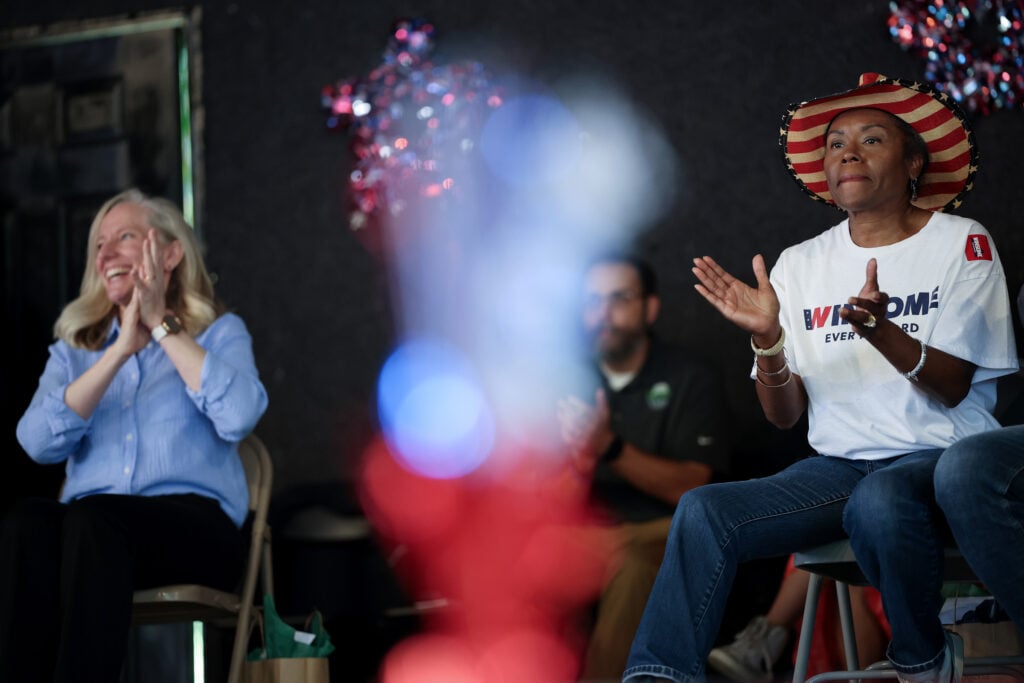
Spanberger is running against Virginia’s current lieutenant governor, Winsome Earle-Sears, an evangelical ex-Marine who immigrated to the US from Jamaica. Earle-Sears is in a tricky electoral position: defending the President in a state where about 55 percent of residents disapprove of him. It’s led to some gaffes. In March, for instance, audio leaked of her saying it’s “not unusual” to lose a job—that it “happens to everybody all the time”—so she’s not sure why the media is treating DOGE as “this huge, huge thing.” In August, she was asked on CNN if she supports federal-workforce cuts, and she wouldn’t answer. Earle-Sears can’t disavow Trump and risk alienating his base or provoking his wrath, but she’s struggling to embrace a domestic-policy agenda that UVA researchers have suggested could cost Virginia billions in GDP.
The morning Spanberger spoke at the IBEW hall, Politico had reported that top Republican donors were souring on Earle-Sears, “not looking to throw more money at what they increasingly see as a losing campaign.” This state of affairs meant, essentially, that Spanberger could run out the clock—and she seemed to be doing just that: no major missteps, few bad news stories, staying on message, not making waves. Farnsworth described her strategy in football terms: a series of three-yard plays, right to the end zone. “There are no 40-yard passes in a Spanberger campaign,” he said. “There’s no high-flying spectacles.” Steady, not dazzling, is her style.

By 2016, Spanberger had left the CIA for a quieter life in the Richmond suburbs, raising three young daughters and working for a company that provides services to schools. For most of her career, the idea of running for office had seemed “laughable.” But then Trump became President. After the election, she joined a group of Democrats—mostly women—who’d carpool around their district attending the town halls of their Republican congressman, Dave Brat. It got under his skin. Infamously, Brat lamented that “the women are in my grill no matter where I go.”
At the time, a mounting refrain in Spanberger’s orbit was Somebody has to run against Dave Brat—and she toyed with the idea that she might do so herself. “Then I started really thinking about it,” she said, “and it seemed insane.” Her kids were little, she had no experience as a candidate, and she’d have to publicly talk about her career. “My employment had only just gotten declassified, so I could barely say the word ‘CIA’ out loud without, like, making a weird grimace face.”
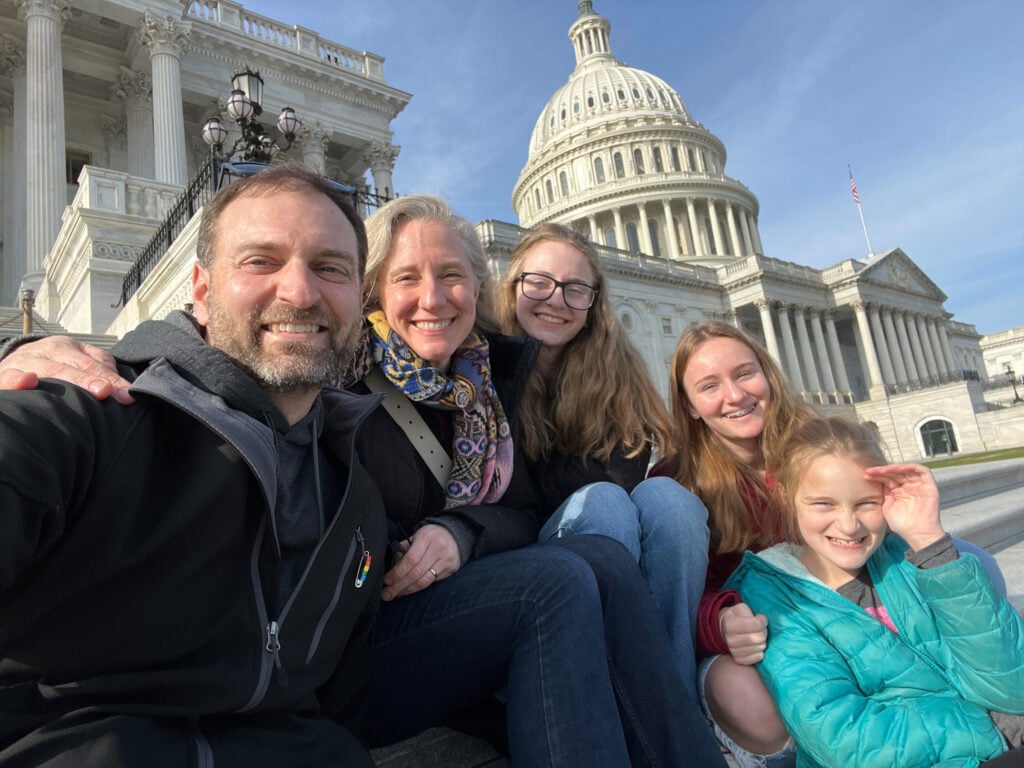
In 2017, on the day that the House of Representatives voted to kill the Affordable Care Act, Spanberger watched the Rose Garden ceremony from work. Her close friends’ daughter had recently been diagnosed with a degenerative neurological disease and the family was staring down years of intensive medical care, knowing that in the end they’d lose their child. Now their healthcare was under attack. “I just got so mad,” Spanberger said. “I called my husband, like, ‘I’m gonna run and I’m gonna fucking win.’ ”
Spanberger did win, of course—and in 2019 she was sworn in to represent a district Trump had carried by seven, where resistance liberalism had little purchase and the Democratic brand was bad. Immediately, she distanced herself from her party; her very first vote in Congress was against Nancy Pelosi for speaker. In the years that followed, she criticized Biden on spending, tried to ban members of Congress from trading stocks, collaborated with Republicans on bills like the Social Security Fairness Act, and, in 2020—after Democrats lost seats in the House—begged her colleagues to please, please stop talking about socialism and defunding the police. In the meantime, she kept her head down and worked on non-flashy issues that mattered to her district, such as rural broadband, highway repair, and reducing overdose deaths.
Her opponents aren’t really able to dent her momentum, in part because the traditional Republican attacks don’t really stick.
That first term was during the era of #MeToo, of George Floyd. Democrats were seen as ideologues and firebrands. Compromise was morally wrong. In trying to keep her party from tacking too far left, Spanberger was fighting against the winds. But now she looks canny. In tough elections, Farnsworth explained, “her opponents aren’t really able to dent her momentum, in part because the traditional Republican attacks don’t really stick.” Spanberger is a former law-enforcement officer who’s consistently ranked among the most bipartisan members of the House. Sure, Republicans can hit her on trans rights, but she doesn’t have the political liabilities of colleagues who drifted leftward on issues like immigration or crime.
In running for governor, Spanberger probably has room to move left—the state is more liberal than her district, and the overall environment for Democrats is good. When I asked why she hasn’t, she spoke for almost six minutes straight. It’s partly a personality thing, she said, that she wants to be friends with everyone. (“My husband will say, ‘Not everyone is going to agree with you or like you,’ and my retort is ‘Yeah, but I can still try.’ ”) But mostly, she talked about listening. As a lawmaker, she believes that if she’s going to support a policy, she has a responsibility to know what its trade-offs are. That’s required her to form real relationships with Republican colleagues and constituents and listen carefully to what they have to say.
Understanding conservatives has helped Spanberger learn to speak to them, which is among her political strengths—useful for talking to swing voters, and also for building coalitions. She believes that climate change is an “existential threat,” for example, but she said that in Virginia, it’s not always productive to frame it that way. If she talks instead about, say, the national-security risks related to sea-level rise, she can sometimes get skeptics to the table. To Spanberger, that pragmatism is crucial to “actually making progress on things,” but it rankles some factions of her party. “Particularly among the quote-unquote super-progressives, I would have to say, ‘Actually, we’re on the same page on these issues—I just talk about them differently,’ ” she said.
In our interview, I asked Spanberger what she’d learned from progressives. It was the only question that seemed to stump her. “I think I learned a lot,” she said, pausing. After some throat-clearing (“and this is not an indictment of anyone, and this exists across the political spectrum”), she spoke about how some members of Congress measure success as getting media attention, while others view it as passing legislation, as concretely affecting constituents’ lives.

In Virginia’s off-cycle gubernatorial elections, the media glare is bright. Analysts dissect the candidates, polling, fundraising, and messaging, treating the state as a bellwether for the midterms, a test of the electorate’s mood. The new governor immediately gains prominence; purplish Virginia is seen as a breeding ground for national figures. If Spanberger wins, there will be speculation about her future (a Senate seat, a vice-presidential nomination?), about what she means for her party and for the country, and what her victory says about who we are.
Already, there’s rumbling. In August, the New York Times ran an opinion piece arguing that “national security moms” like Spanberger and Slotkin might be an “emerging model of leader” for Democrats, one that could help the party seem tougher and less left-wing. And Farnsworth told me that Spanberger’s no-drama, policy-heavy style could be good for her colleagues to emulate: “I think that maybe America’s had enough show horses and is ready for more workhorses in public life.”
Right now, she’s like, ‘Well, I’ll find a compromise,’ But at the national level, you have to have a clearer sense of where you stand on big issues.
Still, there are reasons for caution. Democrats are hungry for fighters right now, which Holsworth sees as Spanberger’s biggest electoral challenge: to “convince people you’re fighting for them every day.” He brought up Gavin Newsom, the governor of California, who’s been sparring with Trump in the courts, hectoring and needling him online, painting him as ridiculous and small. “People think sometimes that Newsom is a little kooky, a little strange, but they have no doubt that he’s fighting,” Holsworth said. “Spanberger doesn’t have that kind of political orientation.”
For Slotkin, though, Spanberger embodies the “alpha energy” that the Democratic party lacks. Yes, she’s good at compromising, but on fundamental issues—like “free and fair elections” or “how we treat people”—Slotkin said she never backs down. (Spanberger has certainly taken some tough votes, like supporting Trump’s impeachment despite worrying it would cost her seat.) As her political stature grows, though, Spanberger probably can’t have it both ways. “Right now, she’s like, ‘Well, I’ll find a compromise,’ ” Holsworth said. “But when you start talking at the national level, you have to have a clearer sense of where you’re going to stand on big issues.”
During the media gaggle at the union hall, one such big issue arose: the war over partisan gerrymandering. This summer, Texas Republicans redrew their state’s electoral maps, trying to nab five additional seats in the House—and a reporter wanted to know if Spanberger would fight back by redistricting Virginia, as Newsom is attempting to do in California. For some Democrats, the stakes are the preservation of democracy itself. Newsom has accused Republicans of “trying to rig” the midterms, and Obama has said that California’s pushback is a “responsible approach.”
But Spanberger said she had no plans to redraw any maps, mentioning Virginia’s bipartisan redistricting commission, which implied that her hands would be tied. Listening to her, I thought of Farnsworth. This was exactly the kind of three-yard play he described: an answer both politically anodyne and factually correct, saying nothing to overshadow the economic message of the day.
A politician like Newsom throws for 40, holding forth about democracy and making some national news. But why risk an interception when you have a commanding lead? Instead, Spanberger moved on to the next reporter, who had a technical question about energy rates for data centers, the kind of issue she loves: fixable, unsexy, could meaningfully help her constituents by lowering their energy costs. “So there is an SEC case right now reviewing that exact question,” she began, three yards closer to the governor’s mansion without any defense in sight.
This article appears in the October 2025 issue of Washingtonian.
